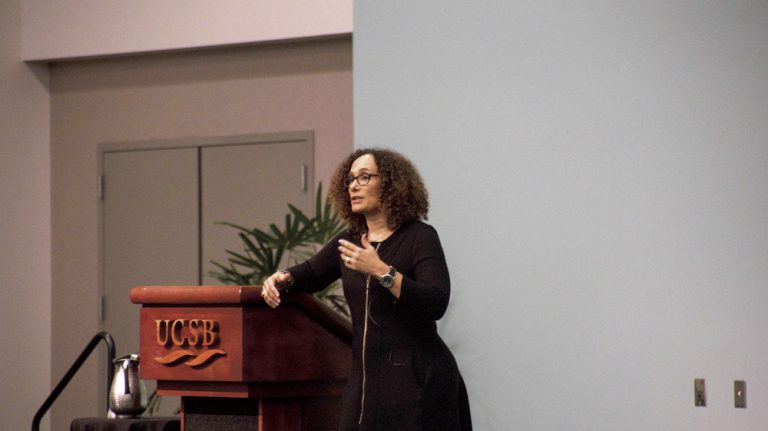
Arturo Samaniego
Staff Writer
On Thursday, Professor Tricia Rose, an associate dean at Brown University, gave an insightful and thoughtful talk on the current social and political climate students have found themselves, and how to respond to it in a constructive manner.
Rose began her “Out of Our Constrictions: Love, Justice, and imagination for a Broken World” with acknowledging the then-impending inauguration of President Donald Trump, a man, she states, who displayed “tremendous hostility” towards minorities and women. She went onto elaborate that Trump, through his rhetoric, engaged in the “criminalization” of people of color, specifically blacks and Mexicans.
Her passion against the president and the rise of white nationalism was on full display as she took on an assertive tone, declaring that a “dog whistle” was no longer being used to invoke hatred and fear of minority groups, but instead a “full blown megaphone” was being utilized.
It was somewhat surprising how Rose followed this clear denouncement of the rising culture of hate not with a call to action but instead with a plea for regrouping and strategizing in order to face this “new frontier.” She touched on the dread she felt upon the election of Trump, and how she felt like taking immediate action, only to later change her mind. Rose claimed that if she had proceeded with action instead of thought, she would have been acting out of fear. Instead she proclaimed that what is important to do now is not just protest or make haste action, but to think of the work needed to build inclusive communities.
Rose declared that those who oppose the culture of hate and discrimination that has risen since the election must figure out exactly what their response will be to the derogatory rhetoric used against minority communities recently. Furthermore, she stated that that all those who oppose cultures of hate must pay greater attention to discriminatory policies that will be masked as “palatable” or “egalitarian,” not to be fooled for a second that these policies are acceptable in any form.
Going along with the theme of identifying subtle discrimination, she also emphasized that we must see the “pitfalls of color blindness” and how it has misled us to believe we are in a meritocracy instead of a society where racial bias is still prevalent.
Rose next engaged the very theme of the series, “Resilient love in a time of Hate,” which means how to love while being hated. “Resilient love,” as Rose explained, “loves under pressure” and is not “unconditional or conditional love.” Most importantly, “Resilient love” asks the question of how to love in a time of hate, while still holding people politically accountable. “Resilient love” appears as love that comes from a place of understanding, and does not engage in hate or divisiveness, but is instead inclusive while still refuting hate in any form. This was a point that Rose made explicitly clear.
As Rose began to conclude her talk she touched on how to respond to the current climate of hate that now surrounds us: through “play.” Rose cited two examples of “play that were used to resist ‘regimes of constraint,'” which were hush harbors and Jamaican flexing. She explained that hush harbors were places of refuge where African slaves would sneak off to under the threat of harm to create new Christian communities.
Jamaican flexing uses rhythmic contortion to tell a narrative, using the body as a tool for storytelling. Though flexing may appear as a simple dance, it can be used as a form of self-expression, with people asserting their Jamaican or African roots, recalling their culture through dance movements, and resisting any challenge to assimilate or forgo their ancestry. According to Rose, people resisted climates of hate through “play,” found ways to express themselves, and built lasting communities.
Through her talk, Rose highlighted the need for thought and not just action in this new heated political and social climate we have found ourselves in. She called for the acknowledgment of discrimination we might have grown ignorant to over the previous eight years. Lastly, she emphasized the importance of resilient love, to understand rather than fear, and to “play” as a way to resist constraints in whatever form they may appear.










